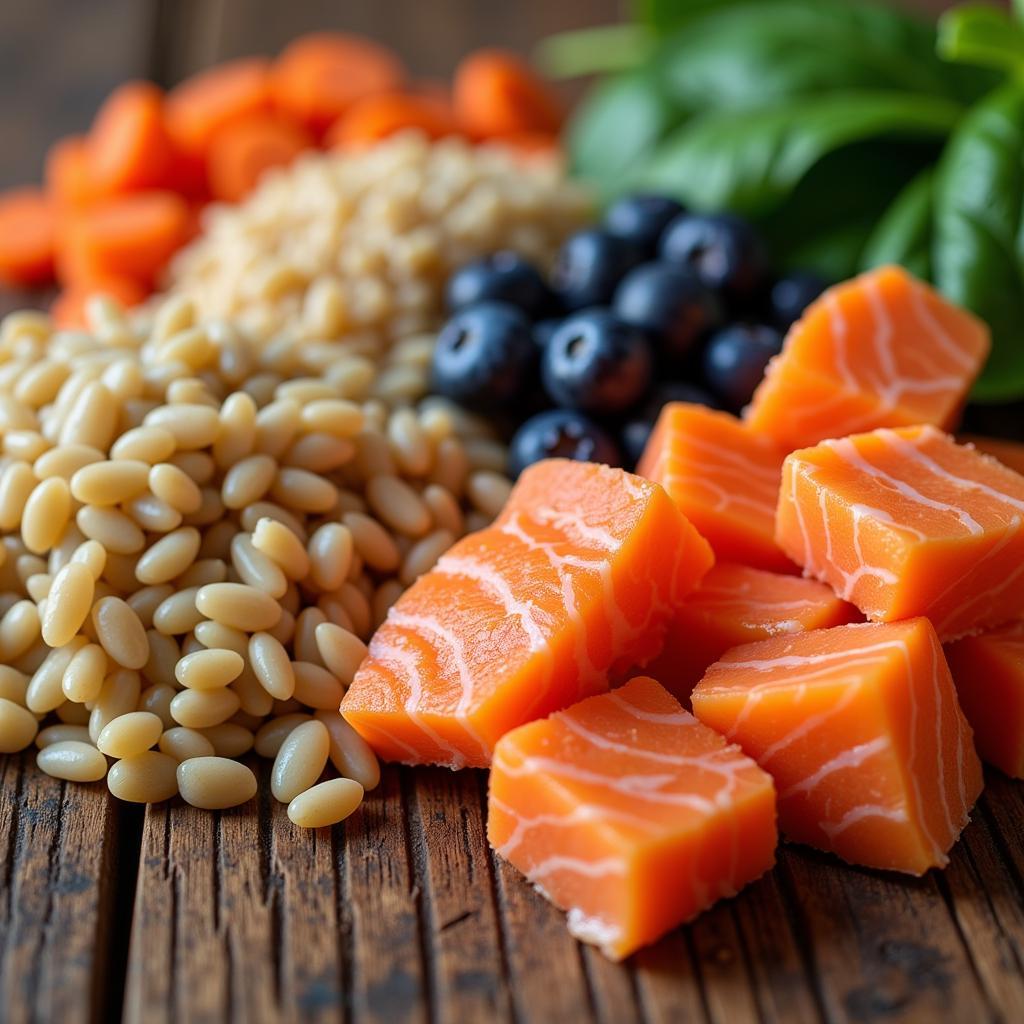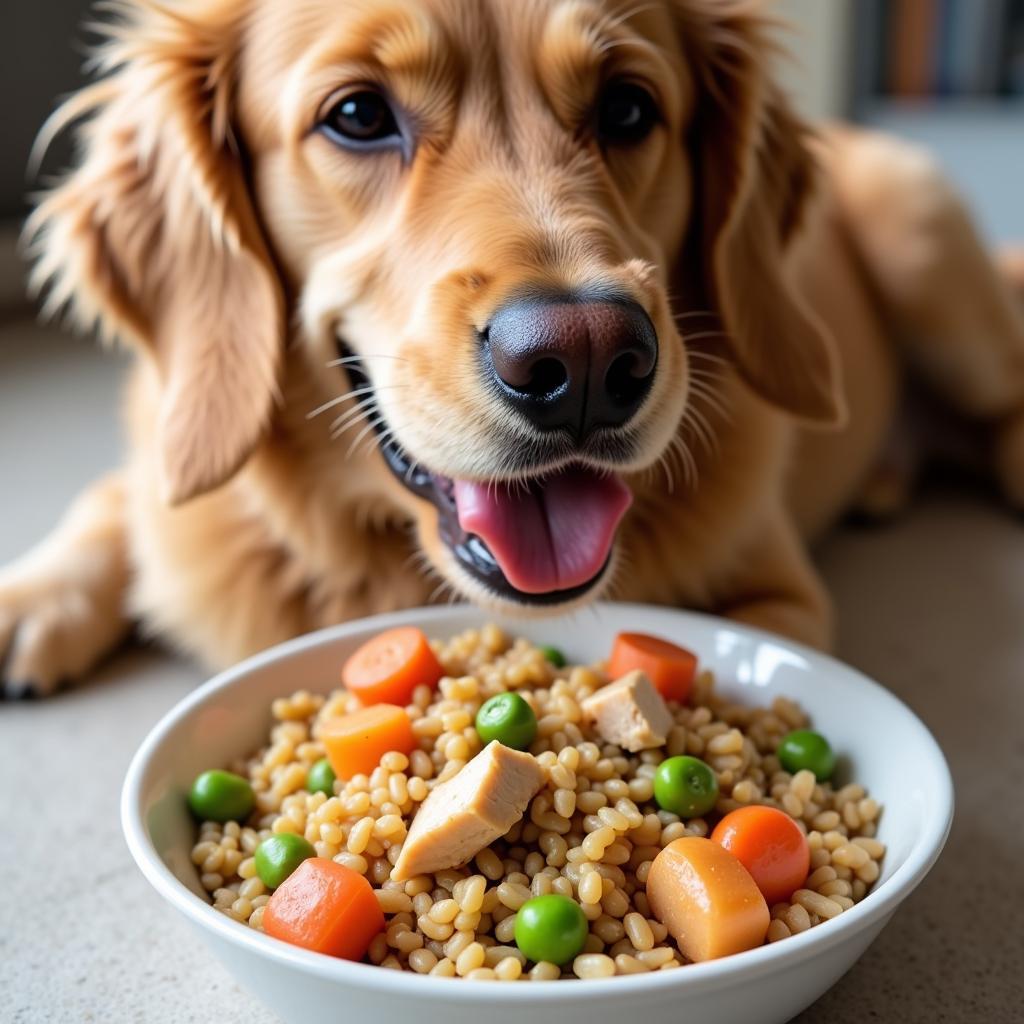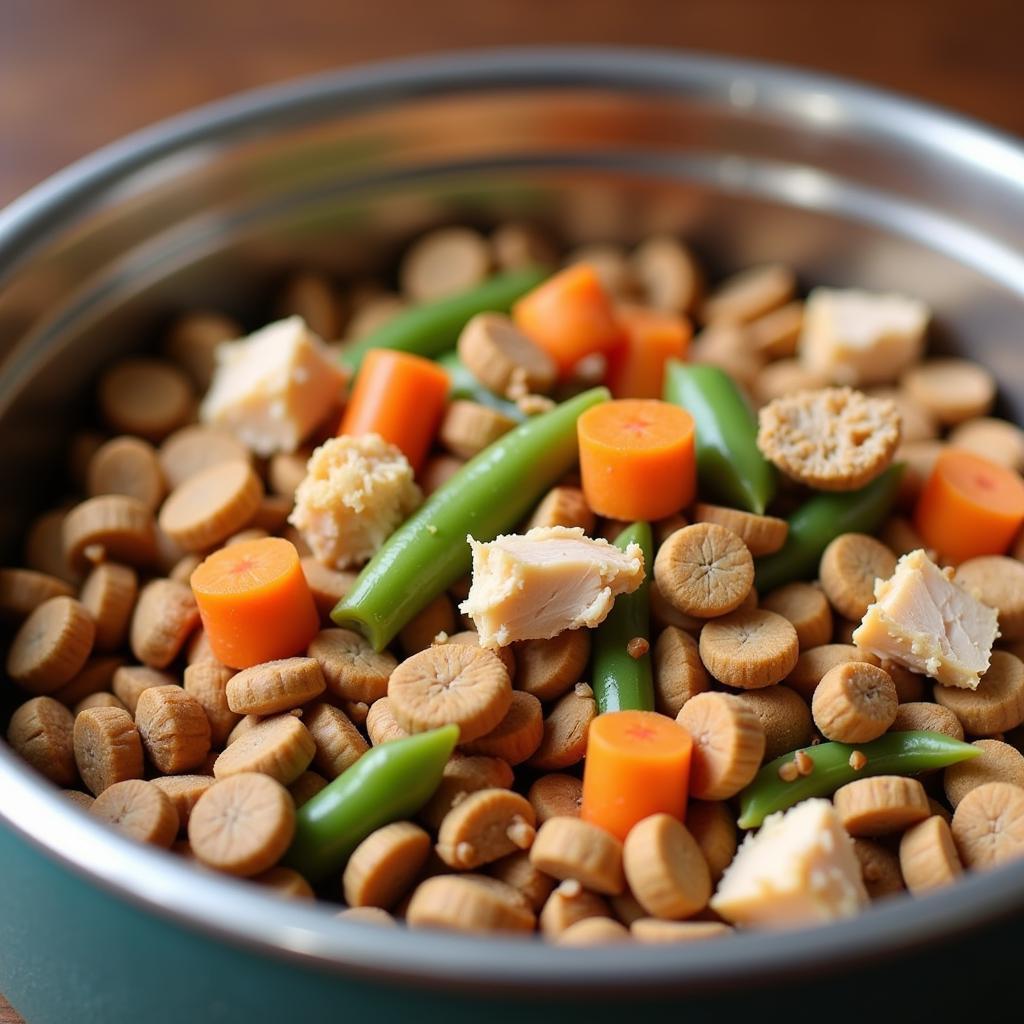Choosing the right food for your furry friend is a big decision. You want to make sure they’re getting all the nutrients they need to thrive, and in recent years, many dog owners have been turning to “Whole Food For Dogs.” But what exactly does that mean?
What is Whole Food for Dogs?
Simply put, whole food for dogs is made up of natural, unprocessed ingredients. Think fresh meat, poultry, fish, whole grains, fruits, and vegetables – foods you can easily recognize and would even eat yourself (maybe!). This is in stark contrast to processed kibble, which often contains fillers, artificial flavors, and preservatives that can be hard for your dog to digest and may even be harmful in the long run.
Benefits of a Whole Food Diet for Dogs
Switching to a whole food diet can do wonders for your dog’s health. Here’s why:
- Increased Energy & Vitality: Fresh, nutrient-rich ingredients provide a steady stream of energy, making your dog feel more lively and playful.
- Shinier Coat & Healthier Skin: The essential fatty acids and vitamins in whole foods promote a healthy coat and skin, reducing shedding and itchiness.
- Improved Digestion: Whole foods are naturally easier to digest, minimizing digestive issues like gas, bloating, and constipation.
- Stronger Immune System: A diet rich in vitamins, minerals, and antioxidants strengthens your dog’s natural defenses, making them less susceptible to illnesses.
 A Colorful Variety of Whole Food Ingredients for Dogs
A Colorful Variety of Whole Food Ingredients for Dogs
How to Transition Your Dog to a Whole Food Diet
The idea of completely overhauling your dog’s diet might seem daunting, but it doesn’t have to be! Here’s a step-by-step guide:
- Consult Your Vet: Before making any major dietary changes, it’s always best to consult your veterinarian. They can assess your dog’s specific needs and recommend the best course of action.
- Gradual Introduction: Don’t switch your dog to a whole food diet overnight. Start by introducing small amounts of whole foods alongside their regular food, gradually increasing the ratio over a week or two.
- Monitor Your Dog’s Reaction: Keep a close eye on your dog for any changes in their stool, energy levels, or overall well-being. If you notice any adverse reactions, consult your vet.
Choosing the Right Whole Food Options
Now comes the fun part – deciding what to feed your furry friend!
- Homemade Meals: Cooking for your dog allows you to have complete control over the ingredients and tailor the meals to their specific needs. However, it can be time-consuming and requires careful recipe selection to ensure balanced nutrition.
- Commercially Prepared Whole Food: Several companies now offer pre-made whole food options for dogs, making it convenient to provide your pup with a healthy diet. Look for brands that use high-quality ingredients and are formulated to meet AAFCO (Association of American Feed Control Officials) standards.
 A Happy Dog Enjoying a Bowl of Fresh, Whole Food
A Happy Dog Enjoying a Bowl of Fresh, Whole Food
Common Concerns About Whole Food for Dogs
Let’s address some frequently asked questions:
Is a Whole Food Diet More Expensive?
It can be, especially if you opt for homemade meals using premium ingredients. However, commercially prepared whole food options can be comparable in price to high-quality kibble.
Is it Time-Consuming to Prepare Whole Food for Dogs?
Homemade meals can be time-consuming, but many time-saving hacks exist, such as batch cooking and freezing meals in advance. Commercially prepared options offer a convenient alternative.
Making the Switch to Whole Food for Dogs
Transitioning your dog to a whole food diet can be one of the best decisions you make for their health and well-being. With a little research and planning, you can provide your furry companion with the nourishment they need to live a long, happy, and active life.
Ready to Explore Whole Food Options for Your Dog?
Check out our articles on the best whole food for dogs and explore a range of wholesome salmon dog food to find the perfect fit for your furry friend!
FAQs
1. Can puppies eat a whole food diet?
Yes, but it’s crucial to work closely with your vet to ensure they receive all the nutrients needed for their growth and development.
2. What if my dog has food allergies?
A whole food diet can be beneficial for dogs with allergies, as you can eliminate common allergens. Consult your vet to identify specific triggers and formulate a suitable diet.
3. Can I mix whole food with my dog’s current kibble?
Yes, you can gradually introduce whole foods alongside kibble during the transition period.
 Mixing Kibble with Fresh Food for Dogs
Mixing Kibble with Fresh Food for Dogs
4. Are there any risks associated with a whole food diet for dogs?
If not formulated correctly, a whole food diet can be nutritionally deficient. Always consult your vet and consider commercially prepared options or recipes formulated by veterinary nutritionists.
5. What should I look for in commercially prepared whole food for dogs?
Choose brands that use human-grade ingredients, avoid artificial additives, and are AAFCO certified.
Need help finding the perfect whole food solution for your dog?
Don’t hesitate to reach out! You can contact our dedicated team at 02437655121, email us at minacones@gmail.com, or visit us at 3PGH+8R9, ĐT70A, thôn Trung, Bắc Từ Liêm, Hà Nội, Việt Nam. We’re here to assist you 24/7!